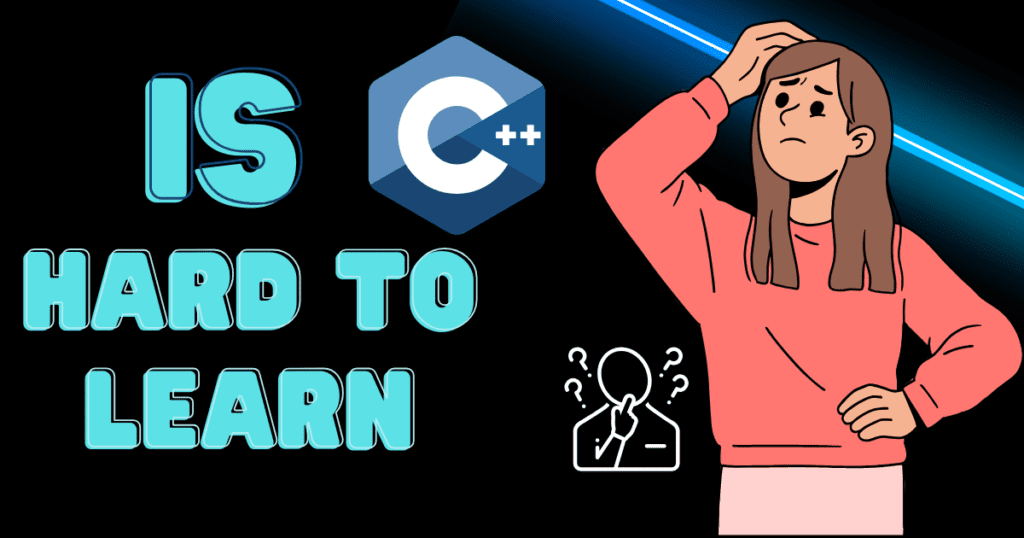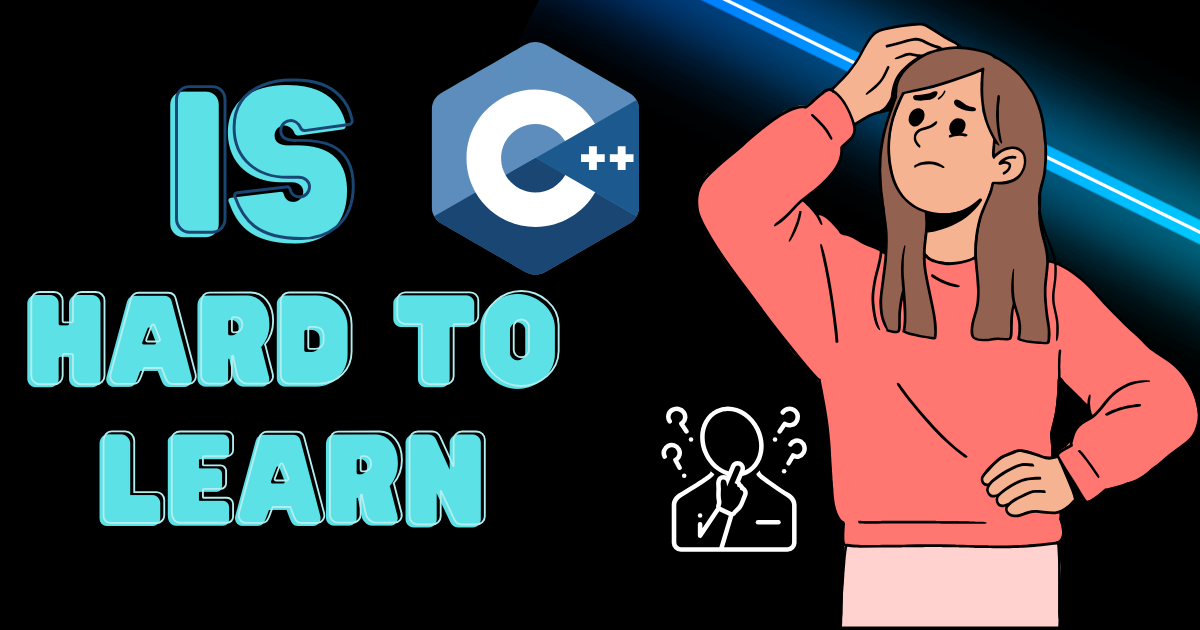Table of Contents
ToggleIs C++ Hard to Learn?
Welcome to the intricate world of C++, a programming language that has withstood the test of time and continues to be a cornerstone in the domain of software development. Aspiring programmers often find themselves at a crossroads, wondering whether learning C++ is a Herculean task or a journey worth embarking on. In this comprehensive exploration, we will delve deep into the complexities that contribute to C++’s reputation as a challenging language, examine the factors influencing this perception, and provide actionable strategies to make learning C++ not only accessible but also an enriching experience. So, is C++ hard to learn? Let’s dive deep into the article to reveal the truth.

Why C++ is Considered Challenging
Complex Syntax and Grammar
C++, stemming from the venerable C language, boasts a syntax that can be intimidating for beginners. Its syntax is powerful and flexible, allowing for both low-level memory manipulation and high-level abstractions. However, this versatility can create a steep learning curve for newcomers, especially when compared to languages with simpler syntax structures.
Breaking Down the Syntax
To navigate this complexity, we must break down the syntax into digestible components. Starting with the fundamentals and gradually progressing to advanced features, such as templates and namespaces, helps in building a solid foundation.
Memory Management
One of the defining features of C++ is manual memory management—a concept unfamiliar to those accustomed to higher-level languages with automatic garbage collection. Pointers and references, while powerful, can be a source of confusion and errors for beginners.
Mastering Memory Management
Understanding memory allocation and deallocation is pivotal. Concepts like dynamic memory allocation, pointers, and the new/delete operators need to be mastered to wield memory management as a skill rather than seeing it as an obstacle.
Object-Oriented Programming (OOP) Concepts
C++ is a staunch supporter of object-oriented programming, introducing concepts like classes, objects, inheritance, polymorphism, and encapsulation. For those new to OOP, this paradigm shift can be daunting. However, once mastered, it becomes a powerful methodology for designing modular and maintainable code.
Easing into OOP
To ease into OOP, start with simple class structures and gradually progress to more complex relationships between objects. Real-world examples and projects are instrumental in solidifying the understanding of these abstract concepts.
Factors Influencing the Perception of Difficulty
Prior Programming Experience
The journey into C++ is significantly influenced by one’s background in programming Individuals with experience in languages like Python or JavaScript may initially find C++ challenging due to its syntax and manual memory management. On the flip side, those coming from a C or assembly language background may feel more at home with C++.
Leveraging Prior Experience
Acknowledging existing knowledge and building upon it is key. Recognize the similarities and differences, allowing prior experience to serve as a foundation for learning C++.
Learning Resources
The quality of learning resources plays a pivotal role in shaping the C++ learning experience. Tutorials, courses, and documentation vary widely in clarity and effectiveness. Choosing reputable resources and seeking guidance from experienced mentors can significantly enhance understanding.
Engaging with the Community
Engaging with online communities and forums to share challenges and seek advice is crucial. A supportive community can be a game-changer in the C++ learning journey.
Individual Learning Style
Every learner is unique, and understanding one’s preferred learning style can make a significant impact. Some individuals thrive on theoretical knowledge, while others learn best through hands-on experience. Finding a balance between theory and practice is key to mastering C++.
Tailoring the Approach
Experimenting with different learning methods, from reading books and documentation to participating in coding challenges and building projects, allows tailoring the approach to align with individual strengths and preferences.
Real-world Applications of C++
C++ isn’t just an academic exercise; it’s a language deeply woven into the fabric of the tech industry, contributing to a myriad of applications.
Industries and Domains Using C++
C++ finds applications in diverse industries, including finance, game development, embedded systems, and high-performance computing. Its efficiency and control over hardware make it a preferred choice for projects where speed and resource utilization are critical.
Efficiency in Diverse Fields
The finance sector relies on C++ for its speed in executing complex algorithms, while the gaming industry harnesses its power for building robust game engines. Embedded systems benefit from C++’s ability to interact with hardware at a low level, and high-performance computing leverages its efficiency for scientific simulations.
Contributions of C++ to Software Development
C++ has left an indelible mark on the evolution of software development. The language has been instrumental in the creation of robust operating systems, game engines, and performance-critical applications. Understanding C++ opens doors to a world where you can influence the very core of computing.
Shaping Technological Advancements
From the development of the Windows operating system to the Unreal Engine powering popular video games, C++ has played a pivotal role in shaping technological advancements. Its influence extends beyond applications; it is embedded in the foundation of modern computing.
Strategies to Make Learning C++ Easier
Breakdown of the Learning Process
To tackle the formidable task of learning C++, break down the process into manageable steps.
Foundational Building Blocks
Start with the basics: variables, loops, and conditionals. As your comfort level grows, progress to more advanced topics like pointers, classes, and templates. Think of learning C++ as constructing a building—one brick at a time. Each concept you grasp becomes a solid foundation for the next.
Practical Application and Projects
Theory alone won’t make you a proficient C++ programmer.
The Power of Practical Application
Apply your knowledge through hands-on coding and real-world projects. Choose projects that align with your interests, whether it’s game development, system programming, or application development. Projects provide a tangible way to apply theoretical knowledge and reinforce understanding. They also serve as a portfolio that showcases your skills to potential employers.
Community Involvement
Joining C++ forums, and online communities, and attending meetups can provide invaluable support and guidance…
The Strength of Community
Engage with experienced programmers, seek advice on challenging problems, and share your own experiences. The C++ community is known for its collaborative spirit, and tapping into this collective knowledge can accelerate your learning journey.
Conclusion
In conclusion, the journey of learning C++ may be challenging, but it’s a challenge worth undertaking…
Unveiling the Rewards of Mastery
The language’s power and versatility open doors to a world of possibilities in software development, from creating efficient algorithms to building high-performance applications. As you embark on your C++ learning journey, remember that difficulties are part of the process.
A Journey Worth Taking
Break down the complexities, engage with the community, and apply your knowledge through practical projects. The rewards of mastering C++ extend beyond personal satisfaction—they include the ability to contribute to cutting-edge technologies and shape the future of computing.
So, is C++ hard to learn?
It may present challenges, but with dedication, perseverance, and the right resources, you can unravel its mysteries and emerge as a proficient C++ programmer. Happy coding!
Also Read: What is Java Used For? The Positive Impact of Java in Software Development
FAQs
Q. Is C++ harder to learn than other programming languages?
- Answer: The difficulty of learning C++ is subjective and depends on individual backgrounds. While its syntax and manual memory management can pose challenges, those coming from a C or assembly language background might find it more familiar. It’s essential to recognize the similarities and differences based on your prior programming experience.
Q. How can practical applications and projects enhance the learning of C++?
- Answer: Practical applications and projects are integral to mastering C++. They provide a hands-on approach to apply theoretical knowledge, reinforce concepts, and build a portfolio. Choosing projects aligned with your interests allows for a deeper understanding of real-world applications and boosts your confidence as a programmer.
Q. What role does the C++ community play in the learning process?
- Answer: The C++ community is a valuable resource for learners. Engaging in forums, and online communities, and attending meetups provides opportunities to seek advice, share experiences, and learn from experienced programmers. The collaborative spirit of the community can significantly accelerate your learning journey and offer insights into best practices.
Q. How do success stories contribute to the motivation of C++ learners?
- Answer: Success stories serve as inspirational tales of overcoming challenges and achieving proficiency in C++. They showcase the transformative power of persistence and dedication. Reading about individuals who started with uncertainties and eventually excelled can motivate learners to persevere through their learning curves.
Q. What are the key lessons to keep in mind when learning C++?
- Answer: Embrace the learning journey and understand that challenges are growth opportunities. Break down the complexities into manageable steps, seek support from the community, and don’t hesitate to ask for help. Practical application, engaging in projects, and reflecting on personal experiences are crucial aspects of mastering C++. Remember, each hurdle is a chance to refine your skills and deepen your understanding of this powerful programming language.
